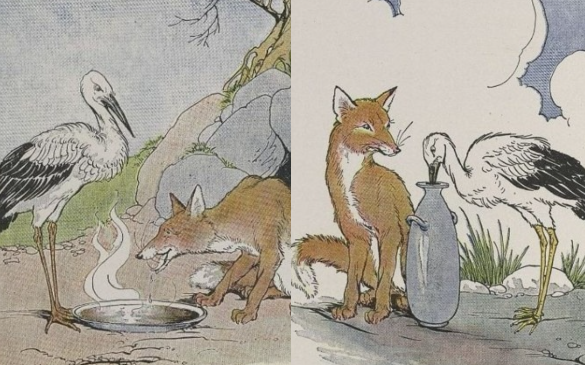| 1. compromise | /KOM-pruh-mahyz/ |
| -an agreement in an argument in which the people involved reduce their demands or change their opinion in order to agree | |
| The neighbors finally reached a compromise. | |
| 2. quarrel | /KAWAWR-uhl/ |
| -an angry dispute or altercation; a disagreement marked by a temporary or permanent break in friendly relations | |
| The quarrel ended after they apologized to each other. | |
| 3. persecute | /PUR-si-kyoot/ |
| -to treat someone unfairly or cruelly over a long period of time because of their race, religion, or political beliefs | |
| He suffered persecution for his beliefs. | |
| 4. conduct | /kuhn-DUHKT/ |
| -personal behavior; way of acting | |
| The young man has good conduct. | |
| 5. deceitful | /dih-SEET-fuhl/ |
| -dishonest or hiding the truth | |
| Deceitful people cannot be trusted. |
The Beasts, too, had cause for fight. The Eagle was constantly pouncing on the Hare, and the Owl dined daily on Mice.
It was a terrible battle. Many a Hare and many a Mouse died. Chickens and Geese fell by the score—and the victor always stopped for a feast.
Now the Bat family had not openly joined either side. They were a very politic race. So when they saw the Birds getting the better of it, they were Birds for all there was in it. But when the tide of battle turned, they immediately sided with the Beasts.
When the battle was over, the conduct of the Bats was discussed at the peace conference. Such deceit was unpardonable, and Birds and Beasts made common cause to drive out the Bats.
And since then the Bat family hides in dark towers and deserted ruins, flying out only in the night.
The deceitful have no friends.
| 1. | What was the reason behind the war between the Birds and the Beasts? |
| 2. | Why was it considered a terrible battle? |
| 3. | Why were the Bats driven out by the Birds and the Beasts? |
| 1. | How did you feel after reading the fable? |
| 2. | Which part of the fable struck you the most? Please explain your answer. |
| 3. | Do you agree with the Bird and Beasts’ decision to drive out the Bats? Why or why not? |
| 4. | How can you tell if someone is being deceitful? |
| 5. | How should a person deal with deceitful friends? |
| Grammar 文法 |
Pronunciation 発音 | Vocabulary 単語 |
Comprehension 理解 |
|
|---|---|---|---|---|
 GOOD GOOD |
文法の誤りはほとんどなく、完全な文章で話すことができる | ほとんどの単語をはっきりと正しく発音することができる | 習った表現を適切に使うことができる | 文章を理解し、質問に正しく答えることができる |
 FAIR |
文法の誤りはあるが、完全な文章で話すことができる | 発音の練習が必要な言葉がいくつかある | たまにミスはあるが、習った表現を適切に使うことができる | 文章を完全に理解するのは難しく、質問に正しく答えられないときもある |
 POOR |
文章で話すのは難しく、単語だけで話すことができる | 発音の練習が必要である | 習った単語と表現を少しだけ使うことができる | 文章を理解するのは難しく、質問に答えるのは難しい |
An eBook from The Project Gutenberg.
This eBook is for the use of anyone anywhere at no cost and with almost no restrictions whatsoever. You may copy it, give it away or re-use it under the terms of the Project Gutenberg License included with this eBook or online at www.gutenberg.org







